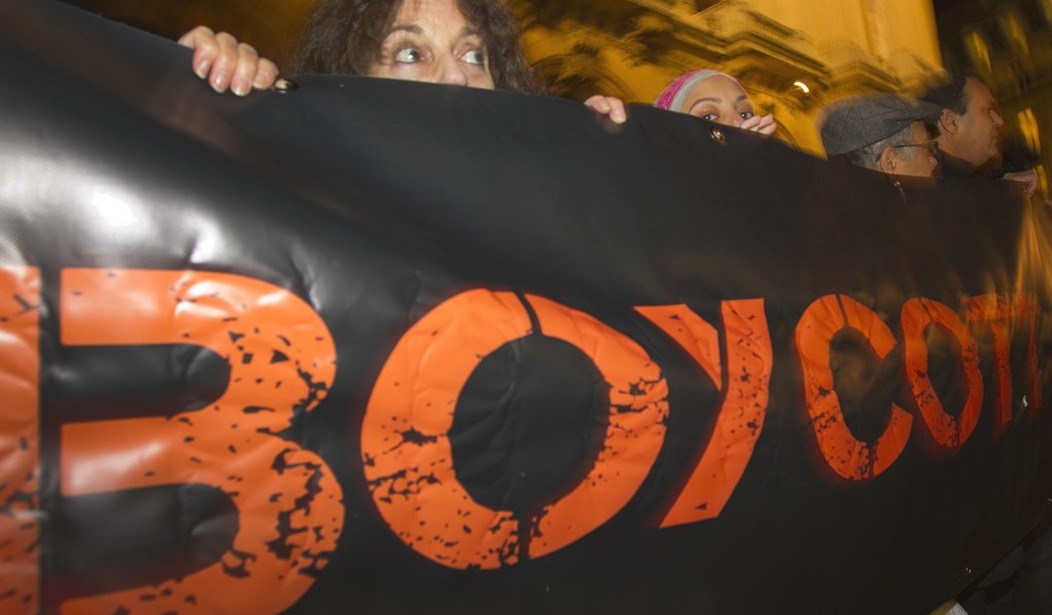Two months after the journalist Abby Martin agreed to give the main address at Georgia Southern University's 2020 International Critical Media Literacy Conference, she was disinvited because she refused to sign a state-mandated declaration that she was not "engaged in" a "boycott of Israel" and would refrain from doing so for the duration of her contract with the university. For Martin, a harsh critic of Israel who supports the Boycott, Divestment and Sanctions movement, that pledge was untrue and unacceptable.
It was also unconstitutional, according to a federal judge who last week allowed Martin's lawsuit against university officials to proceed. The case illustrates how the anti-BDS laws and policies that most states have adopted impinge on expressive activities that the Supreme Court has said are protected by the First Amendment.
"Martin's advocacy of a boycott of Israel constitutes protected activity under the First Amendment," U.S. District Judge Mark Cohen concluded. He added that Georgia's 2016 anti-BDS law, which applies to all state contractors, "burdens Martin's speech and is not narrowly tailored to further a substantial state interest," as required by the "strict scrutiny" test that applies to content-based speech restrictions.
"The certification that one is not engaged in a boycott of Israel is no different than requiring a person to espouse certain political beliefs or to engage in certain political associations," Cohen wrote. "The Supreme Court has found similar requirements to be unconstitutional on their face."
Defenders of laws like Georgia's argue that they do not target advocacy but instead restrict the economic decisions of state contractors. According to this view, legislators are merely responding to the anti-Israel boycott with a boycott of their own.
That take is hard to reconcile with the language of Georgia's statute. Like many other states, Georgia defines "a boycott of Israel" to include not only the choice to eschew certain transactions but also "other actions that are intended to limit commercial relations with Israel or individuals or companies doing business in Israel or in Israeli-controlled territories."
Recommended
The law does not define "other actions," but they plausibly include urging others to protest the Israeli government's treatment of Palestinians by participating in an anti-Israel boycott, something Martin frequently does. Whatever you may think about the ethics or wisdom of that strategy (I question both), such advocacy is indisputably protected by the First Amendment.
The constitutional defense of anti-BDS laws also sits uneasily with the Supreme Court's 1982 decision in NAACP v. Claiborne Hardware, which dealt with a boycott of white merchants in Claiborne County, Mississippi, aimed at securing "compliance by both civic and business leaders with a lengthy list of demands for equality and racial justice." The Court held that "the nonviolent elements of petitioners' activities" -- which, contrary to the reading preferred by supporters of anti-BDS laws, seemingly would include voluntary consumer decisions as well as peaceful picketing and other forms of advocacy -- "are entitled to the protection of the First Amendment."
Federal judges in Arizona, Kansas and Texas have agreed with Cohen that requiring state contractors to sign pledges similar to the one Martin rejected violates the First Amendment. While federal appeals courts vacated the Arizona and Texas decisions, they did so because of legislative changes that exempted the plaintiffs from the pledge requirement, rendering the cases moot.
In 2019, a federal judge in Arkansas upheld that state's anti-BDS law, concluding that the phrase "other actions ... intended to limit commercial relations with Israel" refers to "commercial conduct," not speech. This year the U.S. Court of Appeals for the 8th Circuit disagreed, reading the statute as requiring government contractors to "limit their support and promotion of boycotts" as well as refrain from directly participating in them.
The 8th Circuit concluded that the Arkansas law "restricts government contractors' ability to participate in speech and other protected, boycott-associated activities recognized by the Supreme Court in Claiborne." Even if those activities don't include politically motivated economic decisions, they surely include peaceful advocacy of such choices.
Jacob Sullum is a senior editor at Reason magazine. Follow him on Twitter: @JacobSullum.

























Join the conversation as a VIP Member